E-Pluribus | July 12, 2024
Different is good; making the "elite" a little less so; and remembering the forgotten hostages.
A round-up of the latest and best musings on the rise of illiberalism in the public discourse:
Lauren A. Wright: How Liberal College Campuses Benefit Conservative Students
While “diversity” is often touted as a major plus, colleges at times seem to be more focused on ideological conformity of students rather than their education. Writing at The Atlantic, Princeton’s Lauren A. Wright says everyone can benefit from the challenges that come from keeping company with those who hold disparate worldviews.
Right-wing commentators relish painting elite college students as ignorant, weak, and unprepared to meet the real world. Students have bolstered this perception by struggling to articulate positions on issues for which they profess deep concern.
But this grim picture leaves out an important distinction: Conservative students, rather than being coddled, face significant intellectual and social challenges in college. These challenges impart educational advantages by forcing conservatives to defend their points of view. Liberal students, surrounded by like-minded peers and mentors, have less opportunity to grow in this way.
[. . .]
Some conservatives see a direct connection between their experience defending their views on campus and their success after graduation. Abigail Anthony, a conservative 2023 Princeton graduate, now a reporter at National Review, made her first big journalistic splash as a student: She wrote a 2021 National Review article about how Princeton ignored COVID policies to allow a social-justice event but invoked them to prevent students from attending Easter Mass. Anthony said that the article led to the reopening of the campus chapel. The following year, she wrote another National Review op-ed criticizing Princeton’s Ballet Club for its Instagram statement claiming that the group is “complicit” in “systemic racism” and “white supremacy.” This article received even more attention and prompted Anthony’s removal from a Ballet Club group chat. The thick skin Anthony grew as a conservative at Princeton has already benefited her journalism career, in which she regularly takes on powerful institutions and popular opinions. “I was prompted to defend my own views and commit them to print, and it toughens you up for sure,” she told me.
[. . .]
Who is better prepared for life after college: the conservative students who learned how to mobilize the nation’s leading publications and free-speech organizations, or the progressive students who tried to censor peers for documenting a public protest? I think it’s the former.
Read the whole thing.
Robert Tracinski: The Unnecessary Crisis of Elite College Admission
College is not for everyone, and elite universities are certainly not for everyone. Robert Tracinski at Discourse Magazine says that’s just fine. While top-tier schools have their advantages, they are not a requirement for success. However, Tracinski argues, that doesn’t mean the opportunities they afford could not be made more widely available.
Let’s pause a moment to recognize that there is an overblown emphasis on the importance of attending an elite college. While it is natural for 18-year-olds to think that where they go to college will determine the whole course of their lives, it doesn’t. Half of Fortune 100 CEOs went to state schools, while only 10% went to elite universities. My own experience is that by the time you’re a few years out of school, people stop asking or caring where you went and are more likely to care what you did most recently.
Yet there is a real premium to be gained by going to these schools. It’s hard to measure, because there is also a selection effect. A school that only accepts the top 5% of applicants is taking kids who have already done so much by age 18—or at least figured out how to work the meritocratic system—that they are likely to be economically successful in later life no matter where they go. If attending an elite college is likely to make you part of the 1%, it’s because you are already part of the fewer than 1% of students who are admitted into these schools—and because you are likely to have already grown up in the 1%.
But if attendance at an elite school is a valuable opportunity, it is an opportunity that has been artificially restricted.
[. . .]
The NBER [National Bureau of Economic Research] report attributes elite colleges’ decision not to grow for the past 50 years to a chase for prestige, the idea that the colleges that admit the fewest applicants must therefore be the best. As former Harvard President Larry Summers put it, “What except exclusivity is the rationale for not significantly expanding freshman classes as applicant pools explode?”
[. . .]
This mentality of artificial scarcity is already becoming ingrained in the students themselves. Last year, The Atlantic published a fascinating report from a Yale student about the absurdly competitive process for gaining membership to student clubs. The exclusivity, it turns out, is imposed entirely by the students themselves, as a recapitulation of the exclusive process by which they got into Yale in the first place. It is as if they are continually reenacting their own trauma—and, for all the fashionable posturing about “progressive” values, enforcing an even higher level of privilege and exclusivity.
What is the result? When resources are scarce, we fight over them.
[. . .]
So what are the solutions? The NBER report proposes “allowing elite colleges to coordinate their admissions”—for example, if “the top 200 colleges commit to a minimum admit rate.” But it also points out that this kind of “collusion” “is currently illegal on antitrust grounds under the Sherman Act.”
Perhaps the solution is simply to expand the number of elite colleges—a little more plus to the “Ivy Plus”—with second-tier schools absorbing more of the star students and top faculty who can’t find places at the walled-off elite institutions and thereby increasing their own reputations.
But there are wider constraints that also need to be addressed. The Harvard Crimson article is mostly about an abandoned program to expand Harvard championed by Larry Summers during his tenure as the university’s president 20 years ago. But this plan faced resistance from locals, who protested against building more campus facilities and dorms for new students.
[. . .]
Reducing the artificial scarcity of elite educational opportunities is a solution—not just for the anxiety of students and their parents, but for the cultural, ideological and socioeconomic narrowness of elite institutions. More students would mean a more diverse student body in all respects.
More deeply, it would return the universities to their stated mission, which is not to serve as super-exclusive private clubs, but to provide high-quality education to the people who will take on prominent roles in the nation and in their communities.
Read it all here.
John Ondrasik: America’s Invisible Hostage Crisis in Gaza
In 1979/1980, ABC News launched Nightline with Ted Koppel to keep Americans abreast of the plight of 52 American hostages in Iran. Today, five Americans are still being held by Hamas in Gaza, and yet little if anything is reported about their situation. Writing in the Wall Street Journal, Five for Fighting singer John Ondrasik says while the media is responsible for its silence, the larger public is not innocent either.
I’m old enough to remember the yellow ribbons. In 1979, Islamic radicals in Iran took 52 Americans hostage, holding them for 444 days. The hostages’ plight captured the nation’s attention. Some of them became household names. Across the country people prayed for their release.
The crisis was the lead story on the news every night. Tying a yellow ribbon on a tree or lamppost became a public expression of sorrow and concern. Even the White House Christmas tree had one.
What a contrast to our current hostage crisis. On Oct. 7, 2023, Hamas killed more than 30 American citizens and took as many as a dozen Americans hostage. Of those who were taken, at least two have been murdered. Five, we pray, are still alive. Do you know any of their names? Have you seen one yellow ribbon?
You may have heard of Hersh Goldberg-Polin, 23, who was born in Berkeley, Calif., and lived in Richmond, Va., before emigrating to Israel with his parents at age 7. Hersh attended the Nova music festival on Oct. 7. During the massacre, a Hamas grenade blew off his left arm below his elbow. In April, his captors released a propaganda video of a weary and tormented Hersh speaking to the camera. Did you see it? Do you think you could pick him out of a lineup?
[. . .]
Jimmy Carter had his flaws as president but at least, with Operation Eagle Claw, he attempted to rescue our hostages from Iran. President Biden rarely mentions our fellow citizens who are being held by barbaric terrorists. Their freedom doesn’t seem to be a high priority for his administration. Frankly, the plight of our hostages doesn’t seem to mean much to most Americans.
Read it all.
Around Twitter (X)
Is a protest organizer culpable for the actions of those who join the protest? A District Court in Louisiana says no, and free speech advocates agree:
Via the Jewish Institute for Liberal Values, here’s the beginning of a thread on activist scholarship:
And finally, not only has the Biden campaign provided suggested questions for interviewers to ask the president, it has requested that an interviewer edit the president’s answers—and they did!





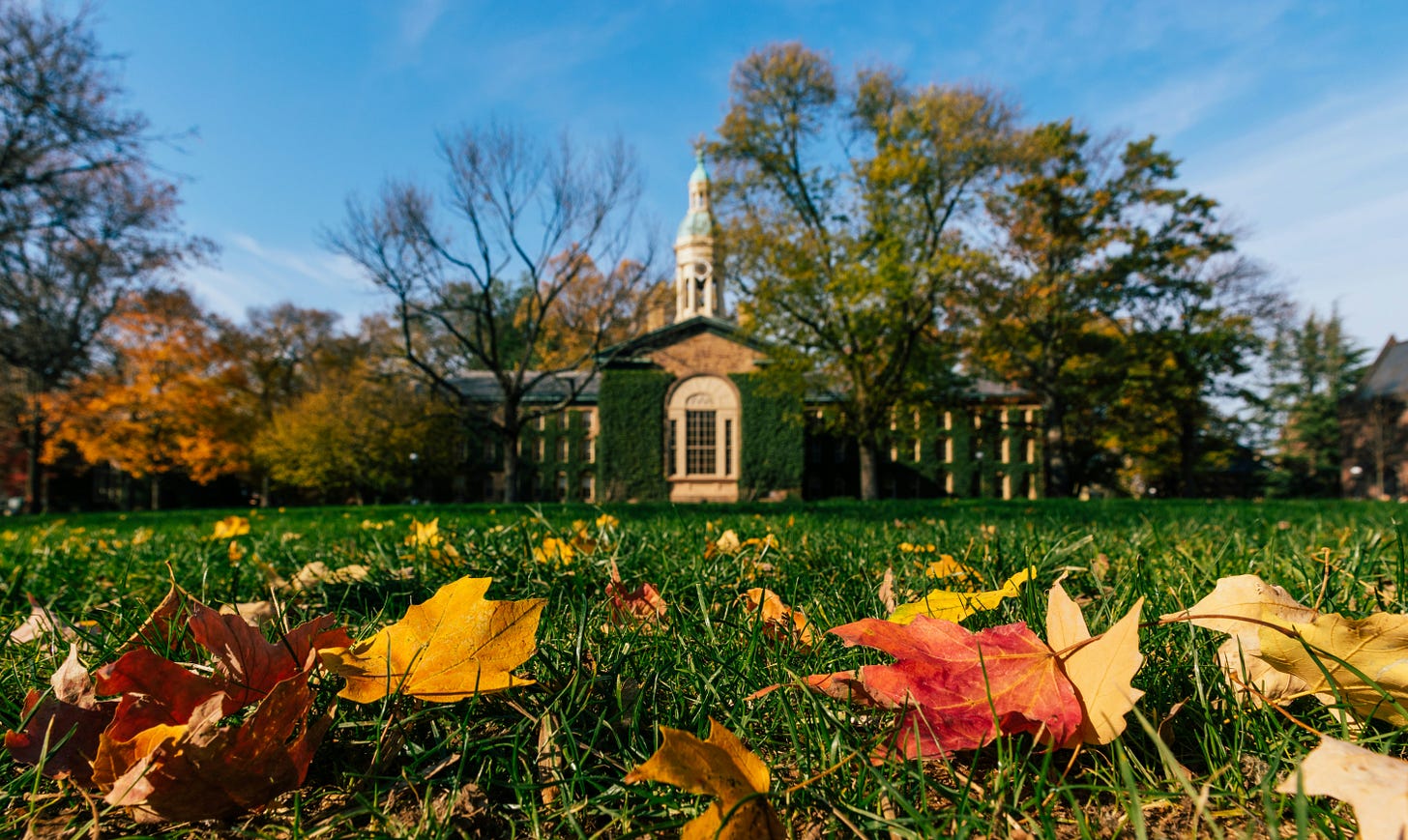

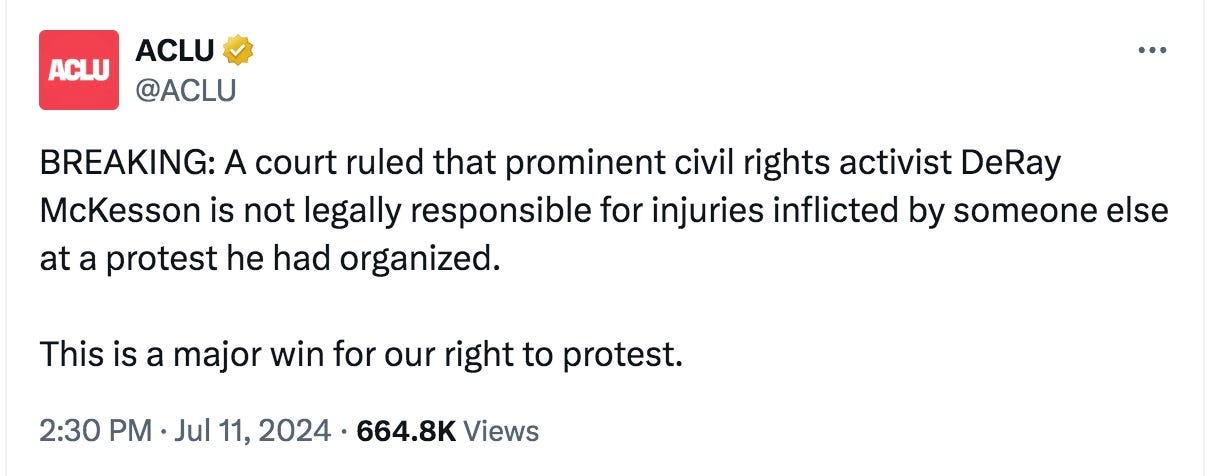
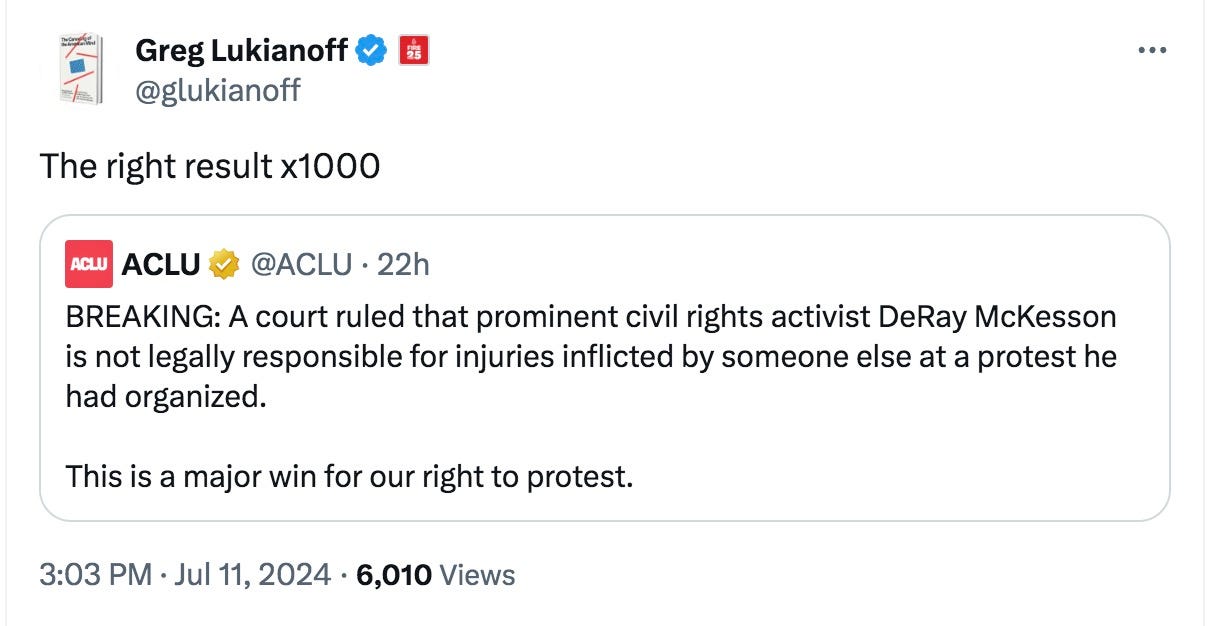
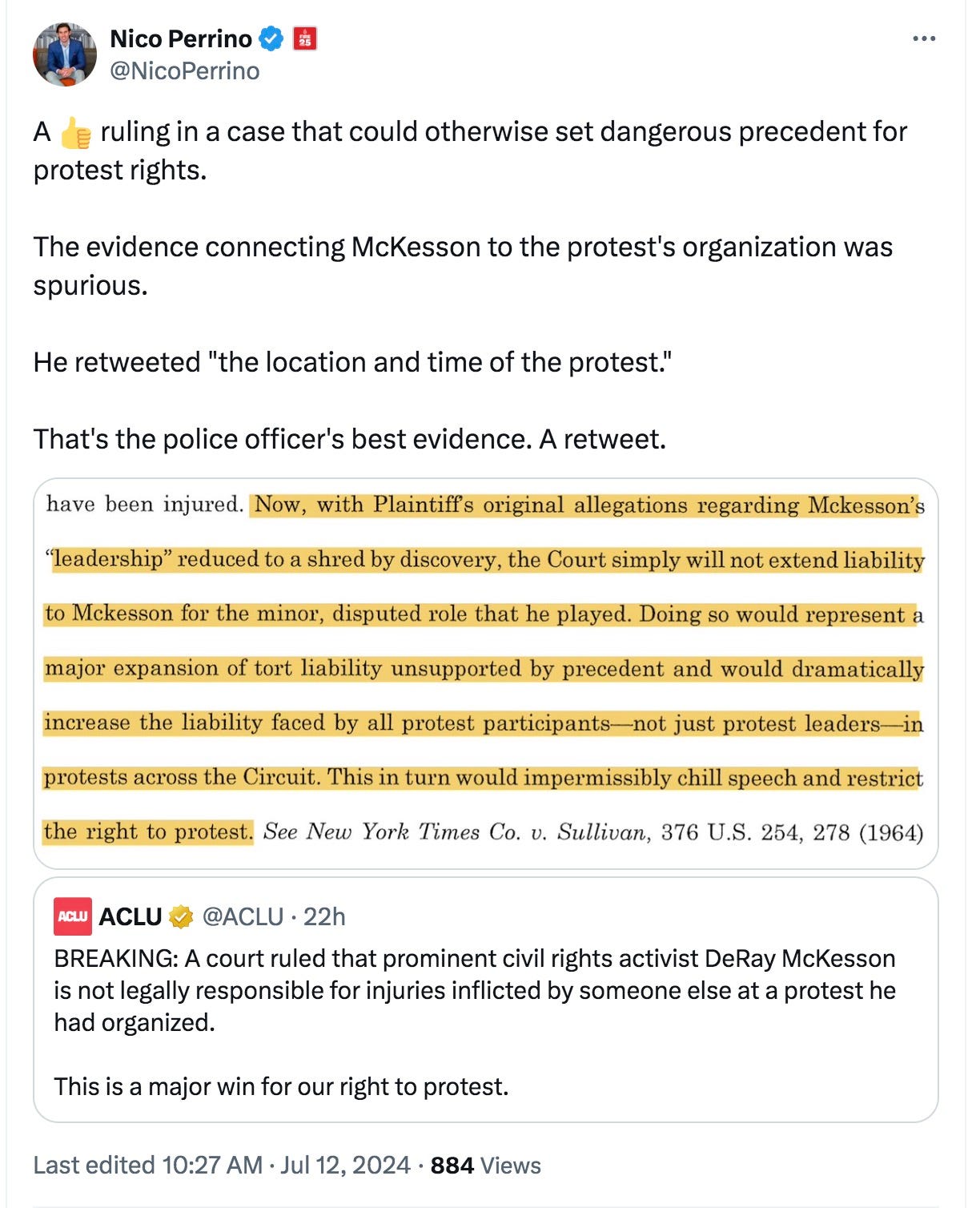
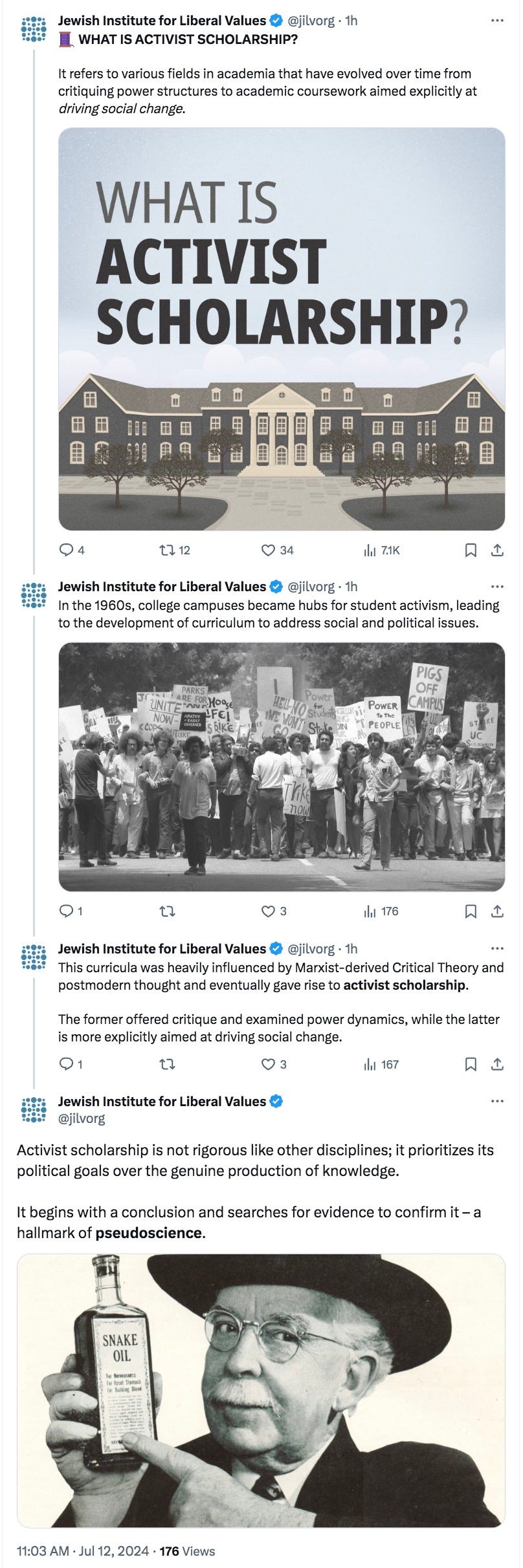
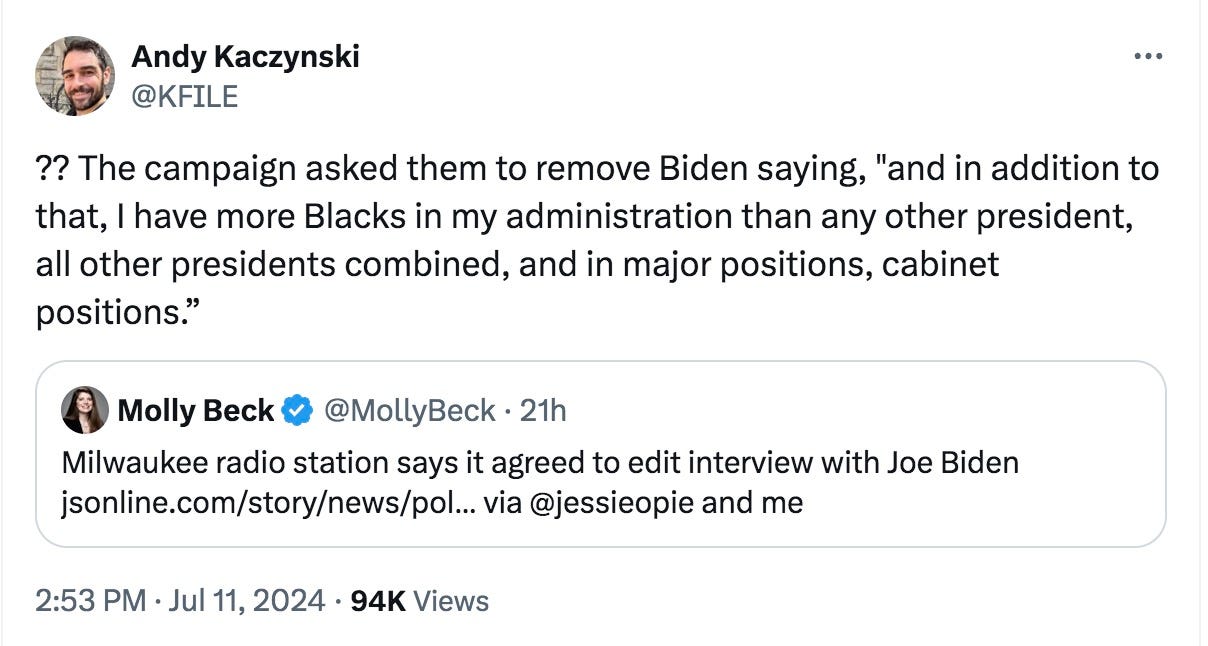
Scholarship: many questions, few answers, all subject to revision.
Activist scholarship: many questions, same answer, attempt to revise at your own peril.